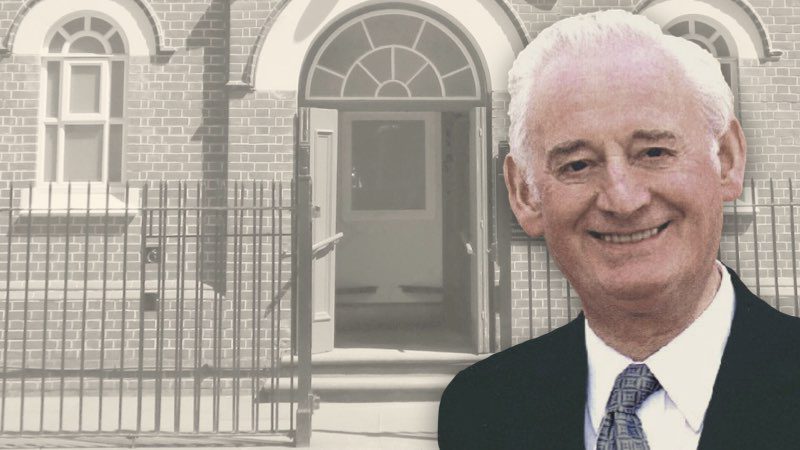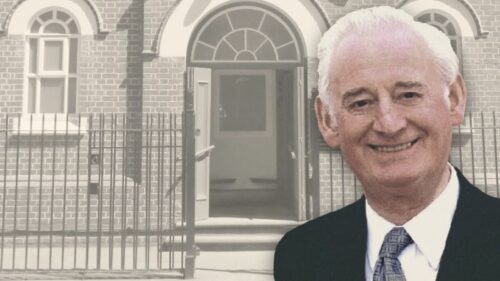
The Dying Thief
[Posted by permission. Bethel Strict Baptist Chapel.]
Sermon preached at Bethel Chapel, Luton, by Mr. B.A. Ramsbottom, on Lord’s day evening, 17th April, 2022 (Easter Sunday)
“And he said unto Jesus, Lord, remember me when Thou comest into Thy kingdom. And Jesus said unto him, Verily I say unto thee, To day shalt thou be with Me in paradise” (Luke 23. 42, 43).
Was there ever such a display of the riches of sovereign grace! Nothing but grace reigns here! Man’s merit has no part. Just consider the character of the dying thief. He is described as a malefactor, an evil doer. Whenever I have mentioned the dying thief over the years, and we have had visitors from Holland, they have always been surprised, because they say that the Dutch version speaks of him as the murderer, the dying murderer. He had nothing, not one claim upon the justice of God or the mercy of God. If you look in one of the other gospels, we are told that both the thieves reviled the dying Saviour, casting scorn upon Him, saying, “If Thou be the Son of God, come down from the cross”; “save Thyself and us.” There was no claim whatsoever that this man could have, why he should ever be found amongst the people of God, why he should be saved with an everlasting salvation, but we find that “where sin abounded, grace did much more abound.”
In this remarkable account, we have to admire the sovereignty of God. Whatever attempts have been made to explain it away, we can only come back to this: the sovereignty of God, who is “too wise to err, too good to be unkind.” There were two thieves there, two malefactors, both dying, both unworthy, both wicked sinners, both perishing in their sin, and one was taken, and the other was left. The Arminians do anything they can to try to explain it. I remember when I was at university, hearing a man preaching on the dying thief, and he touched on this point: one was left to perish in his sins; one was saved by Almighty God. He said, probably what made the difference, that saved thief had a praying mother who was wrestling in prayer for him and her prayers were answered. But if you go into the records, you will find all kinds of suggestions which all would militate against the sheer sovereignty of God. Beloved friends, before the sovereignty of God we need to be silent, and all we can say is, “Even so, Father: for so it seemed good in Thy sight.”
But before proceeding, one point must be solemnly emphasised. There were two thieves, one on the right hand, the other on the left, but only one of them was saved, and the other was left to perish in his sin. Of course, that old saying which has prevailed for many years in our chapels is exceedingly true. Where it came from originally, I rather think it was our hymnwriter, Samuel Medley, but what was said: one thief was saved at the last hour that no-one may ever despair, but only one thief was saved at the last hour, that no man should presume. How many people have been blessed in contemplating the glories of the salvation by grace of the dying thief, but how many have perished through presuming because the dying thief was saved, that when they came to their end, they could pray the same prayer and they too could be saved. May none of us ever seek to leave our salvation and the hopes of our salvation to a dying day.
Now here we have this sacred, solemn account set before us so beautifully by Luke. “One of the malefactors which were hanged railed on Him, saying, If Thou be Christ, save Thyself and us.” He was mocking the Saviour in His sacred office. He was doubting His almighty power. He was throwing scorn on Him. We are told that the other, the penitent thief, at first, even hanging, bleeding, dying, suffering on the cross, was speaking the same. But suddenly grace made a difference, and only grace could make that difference. “But the other.” The Lord had a purpose of love and mercy towards him. He had been loved with an everlasting love. He can never perish. We talk about conversions at the eleventh hour. Well, surely this was almost striking midnight! It seemed as if he was sinking into the pit without hope and mercy. “But the other.” There was a difference. O the tenderness with which he spake! How immediately he revealed that something was happening. “But the other answering rebuked him.” He could not bear the thought of the suffering Saviour being so reviled. It is clear he was ashamed of what he had up till now been doing himself, reviling the Saviour.
But he “rebuked him, saying, Dost not thou fear God?” What did the dying thief know about the fear of God – the fear of God, which is the beginning of wisdom, the fear of God which even now was being implanted in his tender heart, his heart that had been changed, that had been made tender? “Dost not thou fear God, seeing thou art in the same condem- nation?” He had not long to live, but he spoke lovingly and faithfully to his fellow thief. “Thou art in the same condemnation.” And he knew that he himself was in the same condemnation, but by faith he entered into that beautiful truth – no doubt he had never heard it, never read it – but, “there is therefore now no condemnation to them which are in Christ Jesus.” And he was in Christ Jesus, though he did not know it.
“Dost not thou fear God, seeing thou art in the same condemnation? And we indeed justly” – not a word of excuse; not a word to lessen his circumstance. He knew that both of them were suffering justly. And always remember this: when these amazing transactions took place, it was on the cross. You see pictures by some of the greatest artists, and sometimes they make the cross appear a most beautiful, attractive place. It was not. It was a place of death. It was the place of the skull. It was named Golgotha. It was the place of dreadful suffering, a cruel death, death by crucifixion. Who can rightly bear to think of the horrors of crucifixion! And the dying thief was enduring these agonies, and he was speaking of the Lord Jesus who Himself on the cross was in the midst of bearing these dreadful agonies. “We indeed justly.” O what a humble confession! What repentance was there!
But beloved friends, who taught the dying thief all these things? Who taught him that they were just in their condemnation? Who taught him to say, “We receive the due reward of our deeds”? Who taught him to say, “This Man hath done nothing amiss”? Was that just sheer sovereignty, or had he been affected by the Saviour’s prayer: “Father, forgive them; for they know not what they do.” These things we do not know. There is no need for us to know. They are hidden in mystery, the solemn mysteries of the cross!
O but what a confession! “This Man hath done nothing amiss.” He was being put to death by the Jewish rulers, and by the Roman governor, and He was being put to death, a condemned Man. He was being put to death as a guilty Man, and the dying thief knew something different. He had had it burnt in his heart: “This Man hath done nothing amiss.” May you and I, like the dying thief, be sweetly favoured to have a glimpse of the holy, pure, spotless humanity of our Lord Jesus, “a Lamb without blemish and without spot,” and yet all His sufferings made sin for His people, He “who knew no sin; that we might be made the righteousness of God in Him.” It is a beautiful theme: “This Man” – this glorious Man – “hath done nothing amiss.”
“And he said unto Jesus.” Now he begins to pray, and who taught him to pray?
“Prayer is the contrite sinner’s voice,
Returning from his ways.”
Here was a contrite sinner in the hour and article of death returning from his ways, and he knew where to return – only one place, only one Person. “And he said unto Jesus, Lord, remember me.” He called the Lord Jesus, Lord, in that day when the multitudes were mocking and despising Him. Who taught the dying thief that Jesus was Lord? “And he said unto Jesus, Lord, remember me when Thou comest into Thy kingdom.” Who taught him that this suffering, dying Man was a King, and that He had a kingdom, and He had power and authority to give that kingdom to whom He would? And the dying thief in his humility, all he would ask was this – if you will the small- est place in the kingdom – for mercy, for forgiveness, to be remembered. It is a wonderful thing if you and I are remembered by our God. What a prayer!
It seems to me that the dying thief had clearer views of what the kingdom of our Lord and Saviour Jesus Christ is, than at that time Peter and James and John and all the other apostles had! On the day of the ascension, they were saying, “Wilt Thou at this time restore again the kingdom?” They were still hankering after earthly things. But the dying thief had a clearer, better view of a kingdom in heaven. “Lord, remember me when Thou comest into Thy kingdom.” O what a reply! “And Jesus said unto him, Verily.” How often the Lord Jesus began His statements with that word verily before His crucifixion. But the authority with which He now speaks! A dying Man – O but the authority, the power, the mercy, the love, the forgiveness!
“Verily I say unto thee, To day shalt thou be with Me in paradise.” What a wonderful answer and what a sweet confirmation of the everlasting salvation of the dying thief! And do notice this: the Lord said, “Today.” The dying thief would be with the Saviour that very day in paradise. There is no place here for any teaching about some after-thought, an after- confession, and some further repentance; not a hint of such a thing as enduring purgatory for a time. “To day shalt thou be with Me in paradise.” It is a wonderful thought, when the dying sinner closes his eyes in death, immediately he is “with Christ; which is far better.” I have thought of that beautiful hymn of ours:
“In vain the fancy strives to paint
The moment after death,
The glories that surround the saint,
When yielding up his breath.
“One gentle sigh his fetters break;
We scarce can say, ‘He’s gone!’
Before his ransomed spirit takes
Its flight before the throne.”
O to have believing views of death as the entry for the believer into everlasting life!
“To day shalt thou be with Me.” That was the most blessed emphasis of it all: “With Me.” Well, there is a mystery here. Where was the Saviour that day? His lifeless body was lying in the grave of Joseph of Arimathæa, but His ransomed Spirit, which was never separated from His Godhead, was there in the presence of His Father.
“To day shalt thou be with Me in paradise.” Paradise – of course it is the figure of a beautiful garden, and it speaks of a place of absolute peace, happiness, love, enjoyment, no sin, no sorrow. Of course, the sinner who dies in Christ, his soul is immediately “with Christ; which is far better.” His body slumbers in the grave until that glorious day when body and soul shall for ever be united. But that little period of perfect happiness in between is spoken of as paradise. We do not need to be afraid to speak of it as heaven. You remember Samuel Rutherford, in the famous hymn, says,
“’Twixt me and resurrection
But paradise doth stand;
Then glory, glory dwelling
In Immanuel’s land!”
“Verily I say unto thee, To day shalt thou be with Me in paradise.” It has been beautifully remarked that the dying thief was the first one to enter into heaven as a herald to tell the waiting multitude of the redeemed that redemption’s work was now complete.
“Jesus said unto him, Verily I say unto thee, To day shalt thou be with Me in paradise.” Now this is a glorious passage in the Word of God, and these are glorious things, but of course there are so many things here which must belong only to those precious circumstances, that precious time, only to the dying thief and his Lord and Saviour. So there are some things that the Lord’s people here cannot really enter into today, but in the spirit they can, and they must, and they will. Why? Because like the dying thief they realise their need of a Saviour. They cannot do without Him. They cannot be saved without Him. They cannot reach heaven without Him. Also, they are brought to think of the sufferings and death of the Lord Jesus, that in His death He was ransoming His people from sin, death and hell, shedding His precious blood for them, making that great atonement, saving them with an everlasting salvation.
“His death procured thy peace,
His resurrection’s thine;
Believe; receive the full release;
’Tis signed with blood divine.”
So these sacred things can be entered into by the living family of God, and they too, like the dying thief, are taught to pray. For,
“Long as they live must Christians pray;
For only while they pray they live.”
And really the spirit of the prayers of the Lord’s people today is still the same. “Lord, remember me.” I was very interested, the second hymn we sang this evening (214) is really a very beautiful comment on this point. The dying thief prayed, “Lord, remember me,” and sinners today by faith pray the same prayer: “Lord, remember me” – not, “when Thou comest into Thy kingdom,” but as Toplady says, in closing that beautiful hymn, “Awake, sweet gratitude”: “And now Thou in Thy kingdom art, Dear Lord, remember me.”
“Lord, remember me when Thou comest into Thy kingdom.” How often it is prayed today! Now we must not set down a strict line, because people use different language, but it is often this: “Remember me, O Lord, with the favour that Thou bearest unto Thy people: O visit me with Thy salvation.” In essence, that is the prayer of the dying thief, and it will receive the same answer when prayed in faith, in humility, in repentance, in the tender fear of God: “Verily I say unto thee … thou shalt be with Me in paradise.” That is the great point: to be “with Christ; which is far better.”
“Lord, remember me.” There is that lovely scripture that many of the Lord’s people have been brought to love: “Can a woman forget her sucking child, that she should not have compassion on the son of her womb? yea, they may forget” – solemn thing, isn’t it! We read of it in the papers, mothers today forgetting, ill-treating a little child. But the impossibility of it with the Lord! It is a dreadful thing, should the Lord forget a sinner, neglect a sinner. “Yet will I not forget thee. Behold, I have graven thee upon the palms of My hands.” And so we sing,
“Forget thee I will not, I cannot; thy name
Engraved on My heart does for ever remain;
The palms of My hands while I look on I see
The wounds I received when suffering for thee.”
A once-crucified, now risen, ascended, exalted Saviour, who can never, never forget His people, His people He has eternally loved, His people whom He has eternally saved, His people who shall be in heaven with Him for ever and ever. O it is a beautiful subject, the dying thief, and what he said, and what he asked for, and what he received. May you and I do the same, act likewise.
“He said unto Jesus, Lord, remember me when Thou comest into Thy kingdom. And Jesus said unto him, Verily I say unto thee, To day shalt thou be with Me in paradise.”
There is a fountain filled with blood,
Drawn from Immanuel’s veins,
And sinners plunged beneath that flood,
Lose all their guilty stains.
The dying thief rejoiced to see
That fountain in his day;
And there have I, as vile as he,
Washed all my sins away.
Dear dying Lamb! Thy precious blood
Shall never lose its power,
Till all the ransomed church of God
Be saved, to sin no more.
E’er since, by faith, I saw the stream
Thy flowing wounds supply,
Redeeming love has been my theme,
And shall be till I die.
But when this lisping, stammering tongue
Lies silent in the grave,
Then, in a nobler, sweeter song,
I’ll sing Thy power to save.
W. Cowper
Benjamin Ramsbottom (1929-2023) was a Strict and Particular Baptist preacher. In 1967, he was appointed pastor of the church meeting at Bethel Strict Baptist Church, Luton, Bedfordshire, a position he held for fifty-five years.




